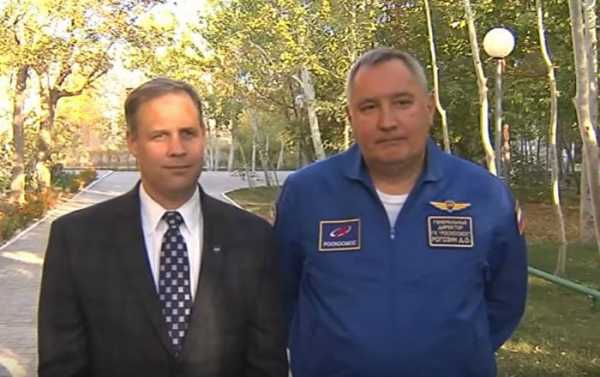
NASA defended its invitation to Roscosmos Director-General Dmitry Rogozin to speak at the space agency’s Houston headquarters in early 2019 from detractors in Washington who say the sanctioned Russian official’s visit “sends the wrong message.”
“The US/Russian relationship in space dates back to the 1970s,” NASA spokeswoman Megan Powers said in a statement to Politico January 1. “NASA has historically invited the head of the Russian space agency to visit the United States. Following this precedent, and Administrator [Jim] Bridenstine’s October visit to Russia to participate in crew launch activities to the International Space Station, NASA invited the Director-General of Roscosmos to visit NASA facilities in the United States,” she said, “and discuss our ongoing space-related cooperation.”
Details about the proposed visit remain scarce. “Planning for a potential visit by the Director-General is still under way,” the NASA spokeswoman told Politico.
Democrats unsatisfied with the prospect of peaceful cooperation between Washington and Moscow in matters related to space lashed out at NASA, pointing out that Rogozin is on the United States sanctions list. “It absolutely sends the wrong message to lift sanctions, even temporarily, for the purpose of inviting him to speak to students at one of our nation’s premier universities,” said Sen. Mark Warner (D-VA), one of the leading Russia hawks in Washington, according to the Politico report.
Neoconservative voices joined Warner’s disapproving sentiment in yet another example of how liberal Democrats and war hawks are increasingly finding themselves on the same side of foreign policy issues. “Wow,” said Heather Conley of the Center for Strategic and International Studies in comments to Politico. “What is difficult for me to understand is what is to be gained for giving a sanctioned individual a public platform.”
A former Defense Department official who served during the Obama administration told the political news publication the potential visit was “appalling” and “utterly inappropriate.”
Rogozin previously noted that since Bridenstine gave a speech at Rogozin’s own alma mater in Russia, Moscow State University, his American counterpart extended a reciprocal invitation for the Russian politician to speak at Rice University in Houston. Bridenstine graduated from Rice in 1998.
Rice University spokesman Doug Miller said NASA has not established dates with the university for when Rogozin may speak, Politico noted. “I don’t know what NASA is working on… As far as we know, there’s no plan for Rogozin to visit Rice if he visits Houston,” the spokesman said.
On December 6, Russian President Vladimir Putin appointed Rogozin to serve as the special presidential representative for international cooperation in the field of space, Sputnik News reported. Roscosmos has said that Rogozin would make his way to the United States as both the head of Russia’s Roscosmos state corporation and as the special representative.
“The dates will be clear after the program [of the visit] is prepared. Based on this, it will be necessary to submit documents,” a spokesperson for Roscosmos told Sputnik December 24. Rogozin may apply for a US visa, though the program of visit has not been formally prepared, the spokesperson said.
Rogozin, a former deputy prime minister, was among the first Russian officials banned from entering the United States in March 2014 for supporting Crimea’s reunification with Russia. The list of US sanctions against Russian officials expanded following Washington’s conclusion that Moscow tried to interfere on US President Donald Trump’s behalf in the 2016 presidential election. Moscow has dismissed allegations of meddling in the election.
“The partnership on the space station has persisted despite all these problems, and worked very well,” John Logsdon, professor emeritus at George Washington University’s Space Policy Institute, told Politico, adding that NASA’s invitation was indicative of the partnership’s success “rather than any broader political issues.”
Sourse: sputniknews.com






